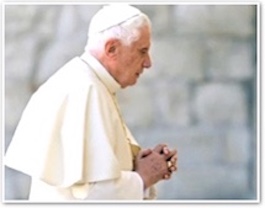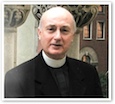Barbarian Hopes
- FATHER GEORGE RUTLER
The film "Cabaret" is better known these days than the novel "The Berlin Stories" on which its screenplay is based.
 Christopher Isherwood described the dissolute culture of a demoralized people, which gave rise to the National Socialists. Heroes in the German Church defied the Nazi outrages, and thousands became martyrs. Bishops who honored the apostolic witness included Felhauber, Galen, Preysing and Frings, while some others were satisfied to adjust to those barbaric times. The heroes had not much support from the papal nuncio, Cesare Orsenigo, who told Preysing: "Charity is well and good but the greatest charity is not to make problems for the Church." The German bishops made a better showing than the Tudor bishops who caved in to Henry VIII, save for John Fisher, who became the only saint among them.
Christopher Isherwood described the dissolute culture of a demoralized people, which gave rise to the National Socialists. Heroes in the German Church defied the Nazi outrages, and thousands became martyrs. Bishops who honored the apostolic witness included Felhauber, Galen, Preysing and Frings, while some others were satisfied to adjust to those barbaric times. The heroes had not much support from the papal nuncio, Cesare Orsenigo, who told Preysing: "Charity is well and good but the greatest charity is not to make problems for the Church." The German bishops made a better showing than the Tudor bishops who caved in to Henry VIII, save for John Fisher, who became the only saint among them.
Pope Benedict XVI, who lived during those hard days in Germany, said in 2002: "Heroic virtue properly speaking does not mean that one has done great things by oneself, but rather that in one's life there appear realities which the person has not done himself, because he has been transparent and ready for the work of God." This is the universal call to holiness of which Saint Francis de Sales preached so solidly.
The German cardinal Walter Kasper has described a "Revolution of Tenderness and Love" that would seem paler than the bold summons of Pope Benedict and St. Francis de Sales. In 2014, Cardinal Kasper said: "Heroism is not for the average Christian." Many seem to have accepted that, for the German Church is in demographic meltdown: priestly ordinations have dropped by half in the last decade, and Mass attendance has plummeted to 10.4%. This contrasts with the amazing growth of the Church in Africa, but Cardinal Kasper has said: "They should not tell us too much what we have to do."
Last Sunday a parade down Fifth Avenue with its raucous obscenities surpassed in decadence anything described in The Berlin Stories. At the same time, I was accompanying a group of visiting "wounded warriors" from Walter Reed Hospital unable to get through the traffic. One young soldier strove to carry his luggage with two prosthetic arms, while trying not to look at the street vulgarity. Such heroism is precisely what bewilders those who take pride only in their lack of heroism. Hilaire Belloc wrote:
The Barbarian hopes — and that is the very mark of him — that he can have his cake and eat it too. He will consume what civilisation has slowly produced after generations of selection and effort, but he will not be at pains to replace such goods, nor indeed has he a comprehension of the virtue that has brought them into being. Discipline seems to him irrational, on which account he is ever marveling that civilisation, should have offended him with priests and soldiers . . . .
 This is Meaghen Gonzalez, Editor of CERC. I hope you appreciated this piece. We curate these articles especially for believers like you.
This is Meaghen Gonzalez, Editor of CERC. I hope you appreciated this piece. We curate these articles especially for believers like you.
Please show your appreciation by making a $3 donation. CERC is entirely reader supported.

Acknowledgement
 Father George W. Rutler. "Barbarian hopes." From the Pastor (July 2, 2017).
Father George W. Rutler. "Barbarian hopes." From the Pastor (July 2, 2017).
Reprinted with permission from Father George W. Rutler.
The Author
 Father George W. Rutler is the pastor of St. Michael's church in New York City. He has written many books, including: The Wit and Wisdom of Father George Rutler, The Stories of Hymns, Hints of Heaven: The Parables of Christ and What They Mean for You, Principalities and Powers: Spiritual Combat 1942-1943, Cloud of Witnesses — Dead People I Knew When They Were Alive, Coincidentally: Unserious Reflections on Trivial Connections, A Crisis of Saints: Essays on People and Principles, Brightest and Best, and Adam Danced: The Cross and the Seven Deadly Sins.
Father George W. Rutler is the pastor of St. Michael's church in New York City. He has written many books, including: The Wit and Wisdom of Father George Rutler, The Stories of Hymns, Hints of Heaven: The Parables of Christ and What They Mean for You, Principalities and Powers: Spiritual Combat 1942-1943, Cloud of Witnesses — Dead People I Knew When They Were Alive, Coincidentally: Unserious Reflections on Trivial Connections, A Crisis of Saints: Essays on People and Principles, Brightest and Best, and Adam Danced: The Cross and the Seven Deadly Sins.




